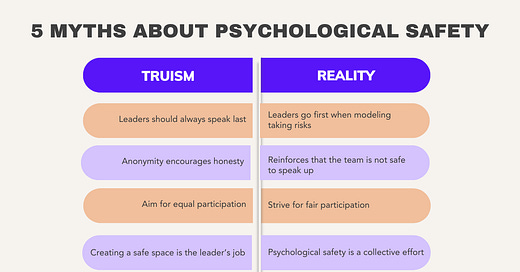5 Myths About Psychological Safety That Hinder Your Team's Growth
Popular truisms about psychological safety backfire when applied without questioning – let's challenge these assumptions
In this week’s post, I challenge five psychological safety truisms and invite you to expand your view on:
Leaders should always speak last
Anonymity encourages honesty
Aim for equal participation
Creating a psychologically safe space is the leader’s job
People need to feel safe to speak up
Psychological safety is a term that’s thrown around a lot these days. It’s hailed as the secret sauce for building high-performing teams, sparking innovation, and creating a culture where people speak up without fear. But here’s the thing: In our rush to achieve this ideal state, we’ve adopted certain “truisms” – supposed rules that define how to build a psychologically safe environment.
Yet these well-intentioned rules of thumb often backfire, creating a rigid approach that stifles – rather than encourages – genuine connection and courage. Let’s explore five popular truisms about psychological safety and why it might be time to rethink them.
Truism #1:
Leaders Should Always Speak Last
One of the most common…
Keep reading with a 7-day free trial
Subscribe to Demystifying Culture with Gustavo Razzetti to keep reading this post and get 7 days of free access to the full post archives.




